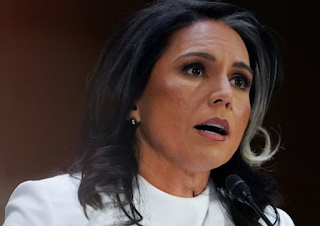U.S. Director of National Intelligence Tulsi Gabbard has pushed back forcefully against former President Donald Trump, after he publicly dismissed her assessment of Iran’s nuclear capabilities as “wrong.” The rare clash between a top intelligence official and a former commander-in-chief has sparked headlines — and highlighted growing tensions around how the Iran threat is perceived and politicized.
What Happened:
During a press interaction, Trump was asked about Gabbard’s recent testimony before Congress, in which she warned that Iran is weeks to months away from being able to assemble a nuclear weapon, should it choose to do so.
Trump’s reaction was blunt:
“Well then, my intelligence community is wrong. Who in the intelligence community said that?”When informed it was Tulsi Gabbard, he replied:“She’s wrong.”
Gabbard's Response:
In a sharp rebuttal posted on X (formerly Twitter), Gabbard said:
“The dishonest media is intentionally taking my testimony out of context and spreading fake news as a way to manufacture division.”
She went on to clarify her stance:
“America has intelligence that Iran is at the point that it can produce a nuclear weapon within weeks to months, if they decide to finalise the assembly. President Trump has been clear that can’t happen, and I agree.”
To further reinforce her position, Gabbard posted the full video of her testimony, arguing that selective reporting was being used to create unnecessary friction.
Context:
-
Gabbard, a former Democratic Congresswoman and 2020 presidential candidate, was appointed Director of National Intelligence earlier this year, a move seen by some as an effort to bring a non-partisan tone to intelligence leadership.
-
Her assessment reflects a widely shared view within the intelligence and defense community, based on Iran’s stockpiles of enriched uranium and advanced centrifuge technology, especially following the collapse of the 2015 nuclear deal (JCPOA).
Political Fallout:
-
The public spat with Trump places Gabbard in a politically sensitive position, especially as Trump remains a frontrunner for the 2024 Republican nomination.
-
While Gabbard emphasized her alignment with Trump’s stated non-proliferation goal, her assertion that Iran’s breakout capability is real and imminent suggests a more urgent timeline than Trump has acknowledged.
Bottom Line:
Gabbard’s response underscores her intent to defend both intelligence integrity and her own credibility in a politically charged environment. The controversy also signals how national security issues like Iran’s nuclear program continue to be deeply entangled with domestic political narratives, especially as the U.S. heads into an election year.



